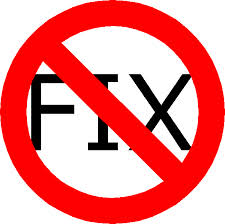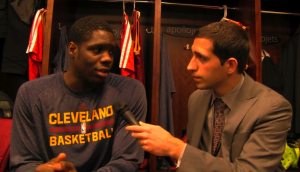 The general manager of the Houston Rockets wants an overhaul of the NBA draft. The Celtics’ assistant general manager has a proposal to do away with the whole shebang. Even new commish Adam Silver is open to changes.
The general manager of the Houston Rockets wants an overhaul of the NBA draft. The Celtics’ assistant general manager has a proposal to do away with the whole shebang. Even new commish Adam Silver is open to changes.
Why?
The NBA draft is fine the way it is. Don’t change it. It’s working just fine. If you’re going to change anything, eliminate the ridiculous incentives that prompts kids – most of them not close to being NBA-ready – to enter the draft after only one year of college.
Daryl Morey, the otherwise generally astute GM of the Rockets, told a sports conference in Boston this past week that “we have to get rid of the marginal incentive to lose.” If it’s marginal, why is it such a big deal? Sure, there are teams that are, um, rebuilding. They’re accumulating losses – and, in many cases, assets.
“It’s bad right now,” Morey said. “I think last year, at the end of the season, I counted like two-thirds of the teams weren’t trying to win.”
Wow. That sounds a bit extreme, given that more than half of the teams in the NBA make the playoffs. (I thought he was a math guy?) And has he forgotten his 2012 Rockets, who conveniently lost seven of their last nine to “sneak” into the lottery?
Mike Zarren, the Celtics’ assistant GM and resident capologist, proposes pre-assigning picks over a 30-year period. In other words, no draft at all. What would ESPN do without a draft show? Can’t see the folks in Bristol allowing that to happen.
The draft is a hot topic because of (a) a presumed number of hotshots who could well enter this year’s draft and (b) a presumed large number of teams who are happy to pile up losses to give them a better shot at the aforementioned lads.
But history and reality have a way of undermining that entire scenario. I wrote a while back on the Cleveland Cavaliers’ situation. Going strictly by drafting numbers, they should be an upper-echelon NBA team. They’ve had two No. 1 picks in the last few years along with two No. 4’s.
 They still are struggling to make the playoffs in the Hindenburg Conference. Their general manager lost his job.
They still are struggling to make the playoffs in the Hindenburg Conference. Their general manager lost his job.
And therein lies the rub. It’s one thing to get the pick. It’s another to make the right one. And then you have to hope the kid blends in, that his new coach won’t drive him crazy and that other things like injuries don’t crop up. You’ve also got a league where maybe two-thirds of the 30 teams know going into the season that they have no chance to win it all.
Look at the teams who would be in the lottery if it were held today. Of the 14 teams who were in the 2013 lottery, nine could well be headed back. A handful of teams – Sacramento, Milwaukee, Detroit, Minnesota and maybe Phoenix – could be headed for a third straight lottery.
Among the teams who were in the lottery last year and appear to be playoff-bound this year, not one of them can make a case that their 2013 draft pick is doing anything substantive to help the cause. The Wizards are just a couple games short of having the third best record in the Hindenburg Conference. But No. 1 pick Otto Porter has averages 8.7 minutes in 25 games. Toronto, currently tied with Chicago for the third best record, took off after trading Rudy Gay. Its lottery pick last year – Steven Adams – went to Oklahoma City and does play 14.6 minutes a game.
Has Cody Zeller’s 5.3 points in 16.7 minutes a game been the difference for the 27-31 Bobcats this season? Try newcomer free agent Al Jefferson for starters. (And yes, that record would put get you a playoff berth in the East right now.)
Alex Len has appeared in 26 games for surprising Phoenix who, methinks, will somehow find a way to get into the lottery. Why else would they refuse to trade one of their many picks for Pau Gasol? Portland has been a big surprise this season but its lottery pick, CJ McCollum, was injured while the Blazers raced off to a 24-5 start. He has appeared in 22 games.
 Meanwhile, Porter ($4.2 million), McCollum ($2.3 million), Adams ($2.09 million) and Zeller ($3.8 million) are getting guaranteed dollars – at a time when most teams are trying to rein in spending – courtesy of the NBA and its players union. Think the Chancellor of the Exchequer in Cleveland enjoys writing the $5.3 million check to Anthony Bennett?
Meanwhile, Porter ($4.2 million), McCollum ($2.3 million), Adams ($2.09 million) and Zeller ($3.8 million) are getting guaranteed dollars – at a time when most teams are trying to rein in spending – courtesy of the NBA and its players union. Think the Chancellor of the Exchequer in Cleveland enjoys writing the $5.3 million check to Anthony Bennett?
The problem, I submit, isn’t the incentive to lose. Or even the marginal incentive to lose. It’s the non-marginal incentive to declare for the NBA draft knowing that there is a large, guaranteed stash of cash ready for you, even if you can’t play. Why that is remains a mystery to me. What other business does that?
Why does the union go for this? Why wouldn’t it instead agree to take that money and distribute it to its veterans?
If the NBA is so concerned about age limits and keeping the college game going, why wouldn’t it agree to make it financially risky (or even punitive) for a player to enter the NBA draft after only one year of college? Or two? Why guarantee a dime to these kids? They’re rookies. They haven’t proven a thing.
Why not dramatically reduce the rookie scale and then peg it to numbers of years in college? The longer you stay, the more money you make when you come out. You come out after one year, you’re making less than six figures.
You can talk till the cows come home about tanking. History has shown it mostly doesn’t work, especially when you’re draft pick is decided by a lottery. But what history also has shown is that more and more kids will come into the NBA and not be ready for it – emotionally, physically and, most important, talent-wise.
The do it because the money is there. Who can blame them? Take that away and maybe you have don’t solve the marginal incentive to lose, if there even is one. But you might help out your league – and the NCAA – which wouldn’t be a bad thing.
Peter May is the only writer who covered the final NBA games played by Larry Bird, Magic Johnson and Michael Jordan. He has covered the league for three decades for The Hartford Courant and The Boston Globe and has written three books on the Boston Celtics. His work also appears in The New York Times. You can follow him on Twitter.
MORE FROM PETER MAY:
CELTICS-LAKERS WAS A BATTLE FOR PING-PONG BALLS
IS THIS THE YEAR A TRADE WILL IMPACT A CHAMPIONSHIP?
WHY TIM DUNCAN REMINDS ME OF JAY LENO
HEAT LOOKING LIKE A TEAM READY TO THREE-PEAT
REUNION TIME IS THE RIGHT TIME FOR PIERCE AND KG
HOW DAVID $HOW ME THE MONEY $TERN RUINED THE NBA
PROPS TO CHRIS GRANT: SOMEBODY WHO FINALLY STOOD UP TO THE LAKERS
A CLEVELAND CAUTIONARY TALE ON WINNING THE DRAFT LOTTERY
WHAT WILL BECOME OF RAJON RONDO?
home insurance car &
hi ya, just wondered if there was a dwonload for this game, or physical copy that wasnt on steam? i dont always have internet access, and i just down like steam.on a mac cheers for help
Hi, as mentioned in the leastt news on the front page the non-Steam versions will be available shortly. Come back to the site in a week and they should be available!I like to release on Steam first because Steam has a fantastic updating system meaning I can fix bugs instantly without the user having to reinstall anything (the patch auto-downloads and auto-installs) so once all the bugs are resolved there then I can release a bug-free standalone version!
Unusual take, but that’s why I come here.
Quite liked Mark Cuban’s thoughts on the D-League turning itself into a genuine alternative to the NCAA for younger players. You could give them an education experience tailored to their actual needs as sportsmen, and also start paying them and hence moderate some of the risk of having a career-ending injury before your first pay check (hard to justify not doing that).
Of course, any of these reforms would make draft picks more immediately useful/attractive and only increase the damaging incentives Morey is talking about.